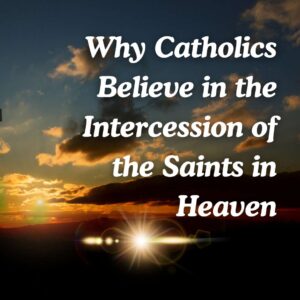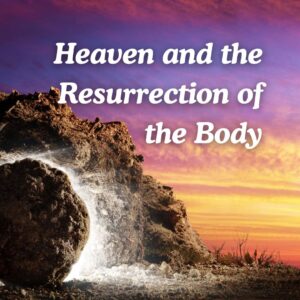 Heavenly intercession is a profound aspect of Catholic spirituality, rooted in the belief that the saints in heaven, along with the Blessed Virgin Mary and the angels, actively participate in God’s plan by interceding on behalf of those still on earth. This belief is deeply connected to the Catholic understanding of the Communion of Saints, which underscores the unity between the Church Militant (those on earth), the Church Suffering (those in purgatory), and the Church Triumphant (those in heaven). In this article, we will explore the theological foundations of heavenly intercession, the role of the saints in Catholic belief, and the significance of this practice in the life of the faithful.
Heavenly intercession is a profound aspect of Catholic spirituality, rooted in the belief that the saints in heaven, along with the Blessed Virgin Mary and the angels, actively participate in God’s plan by interceding on behalf of those still on earth. This belief is deeply connected to the Catholic understanding of the Communion of Saints, which underscores the unity between the Church Militant (those on earth), the Church Suffering (those in purgatory), and the Church Triumphant (those in heaven). In this article, we will explore the theological foundations of heavenly intercession, the role of the saints in Catholic belief, and the significance of this practice in the life of the faithful.
Theological Foundations of Heavenly Intercession
The concept of intercession is deeply embedded in the Bible and is an integral part of Catholic theology. Intercession, in essence, refers to the act of praying or petitioning on behalf of another. The Bible provides numerous examples of intercession, both on earth and in heaven. In the Old Testament, we see figures like Moses and Abraham interceding on behalf of the people (Exodus 32:11-14; Genesis 18:23-33, WEBBE). In the New Testament, St. Paul frequently asks the Christian communities to pray for him (Romans 15:30, WEBBE), underscoring the communal nature of intercession.
Catholic theology further develops this concept by teaching that those who are in heaven are not disconnected from those on earth but remain intimately involved in the life of the Church. The Catechism of the Catholic Church (CCC) states that “being more closely united to Christ, those who dwell in heaven fix the whole Church more firmly in holiness” (CCC 956). This understanding is rooted in the belief that the saints, who are fully united with Christ, continue to participate in His ministry by interceding for the Church.
One of the key biblical foundations for heavenly intercession is found in the Book of Revelation, where the prayers of the saints are presented to God as incense: “The smoke of the incense, with the prayers of the saints, went up before God out of the angel’s hand” (Revelation 8:4, WEBBE). This imagery powerfully illustrates the idea that the prayers of the saints in heaven are pleasing to God and are an essential part of the divine plan.
The Role of the Saints in Catholic Belief
In Catholic belief, the saints are not merely passive observers of the events on earth but are actively engaged in the spiritual welfare of the faithful. This belief is deeply connected to the doctrine of the Communion of Saints, which teaches that all members of the Church, whether on earth, in purgatory, or in heaven, are united in Christ. This unity is not broken by death but is rather perfected, as those in heaven are fully conformed to the image of Christ.
The saints, having attained eternal life, are believed to have a special ability to intercede on behalf of those still on their earthly pilgrimage. This belief is supported by the understanding that the saints are in full communion with God and are thus able to present the needs and petitions of the faithful to Him. The CCC emphasizes this role of the saints, stating, “Their intercession is their most exalted service to God’s plan. We can and should ask them to intercede for us and for the whole world” (CCC 2683).
One of the most significant examples of heavenly intercession in Catholic tradition is the role of the Blessed Virgin Mary. As the Mother of God and the Queen of Heaven, Mary is believed to have a unique and powerful intercessory role. The Catholic Church teaches that Mary, by her singular cooperation in the work of salvation, continues to intercede for the faithful, drawing them closer to her Son, Jesus Christ. The CCC affirms this belief, stating, “The motherhood of Mary in the order of grace continues uninterruptedly from the consent which she loyally gave at the Annunciation and which she sustained without wavering beneath the cross until the eternal fulfillment of all the elect” (CCC 969).
The saints’ intercession is also seen as a reflection of their love for the Church. As members of the Church Triumphant, the saints have a profound love for those who are still journeying toward eternal life. This love motivates them to intercede continually for the Church, asking for God’s grace and mercy to be poured out upon the faithful.
The Significance of Heavenly Intercession in the Life of the Faithful
Heavenly intercession is a source of great comfort and encouragement for Catholics. The belief that the saints and angels in heaven are praying for them provides the faithful with a sense of spiritual support and solidarity. It is a reminder that they are not alone in their struggles but are part of a larger spiritual family that spans heaven and earth.
This belief also deepens the Catholic understanding of prayer. Prayer, in the Catholic tradition, is not a solitary act but a communal one. When Catholics pray, they do so in the context of the Communion of Saints, joining their prayers with those of the saints and angels in heaven. This is beautifully expressed in the liturgy, particularly in the Eucharistic prayers, where the Church on earth joins with the heavenly hosts in praising God.
Moreover, the practice of asking for the intercession of the saints fosters a deeper relationship with them. Catholics are encouraged to develop a devotion to particular saints, seeking their intercession for specific needs or challenges. This practice is not about placing the saints above God but rather about recognizing their role as powerful intercessors who can bring the faithful closer to God.
Heavenly intercession also has an eschatological dimension. It reminds the faithful of their ultimate destiny in heaven and encourages them to live in a way that is worthy of that calling. By asking for the intercession of the saints, Catholics are reminded of the virtues that the saints exemplified and are inspired to imitate their holiness in their own lives.
Practical Implications of Heavenly Intercession
The belief in heavenly intercession has several practical implications for the daily life of Catholics. First, it encourages a strong devotion to the saints, particularly through the practice of invoking their intercession in prayer. This can be done in various ways, such as through the recitation of the Litany of the Saints, praying novenas, or simply asking for the prayers of a patron saint.
Second, the belief in heavenly intercession fosters a sense of spiritual solidarity within the Church. Catholics are encouraged to see themselves as part of a larger spiritual family that includes not only the faithful on earth but also the saints in heaven and the souls in purgatory. This understanding can inspire a greater commitment to praying for others, both living and deceased, knowing that such prayers are part of the Church’s universal mission.
Third, heavenly intercession can provide strength and encouragement in times of trial. Knowing that the saints are interceding on their behalf, Catholics can find comfort and hope in the midst of suffering. This belief can also inspire perseverance, as the faithful are reminded that they are not alone in their struggles but are supported by the prayers of the entire Communion of Saints.
Finally, the practice of heavenly intercession can deepen one’s relationship with God. By seeking the intercession of the saints, Catholics are drawn closer to God, as the saints’ prayers are ultimately directed toward helping the faithful grow in holiness and union with God. This practice also reflects the Catholic understanding of the Church as a mystical body, where all members are united in Christ and work together for the salvation of souls.
Conclusion: The Power of Heavenly Intercession
Heavenly intercession is a powerful and comforting aspect of Catholic belief, rooted in the Church’s understanding of the Communion of Saints. The saints, along with the Blessed Virgin Mary and the angels, are seen as active participants in God’s plan, interceding for the faithful and helping them on their journey toward eternal life. This belief not only deepens the Catholic understanding of prayer but also fosters a sense of spiritual solidarity and support within the Church. By seeking the intercession of the saints, Catholics are reminded of their ultimate destiny in heaven and are encouraged to live lives of faith, hope, and love, confident in the knowledge that they are supported by the prayers of the entire Church, both in heaven and on earth.
You may also want to read the book “What Should You Look Forward To In Heaven?”




